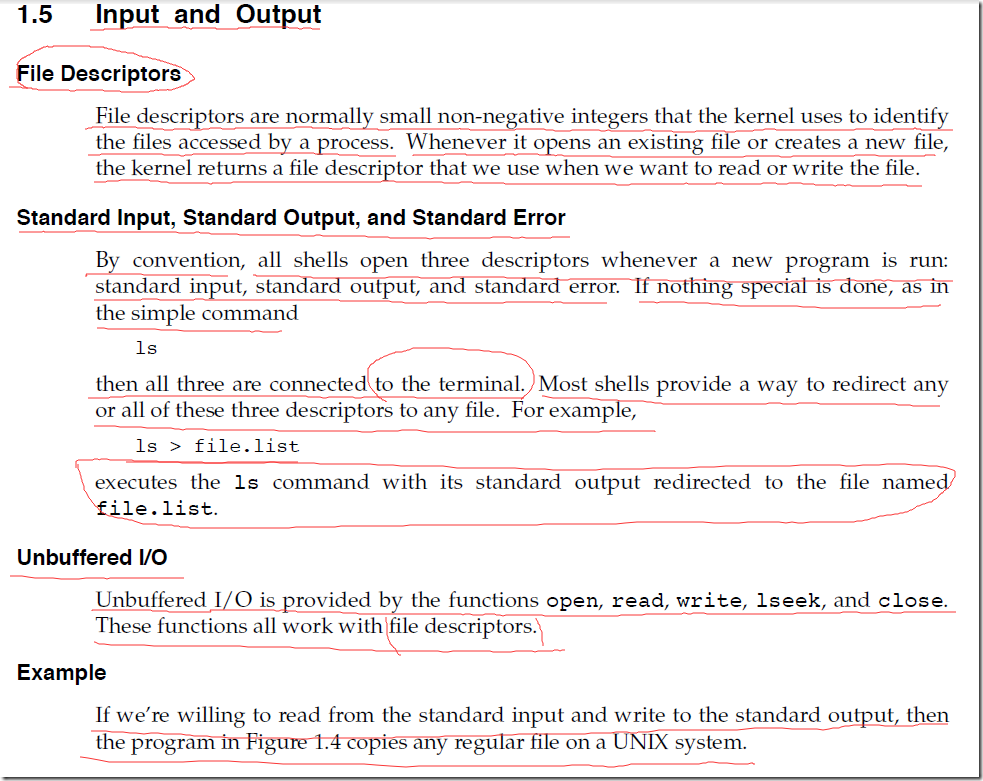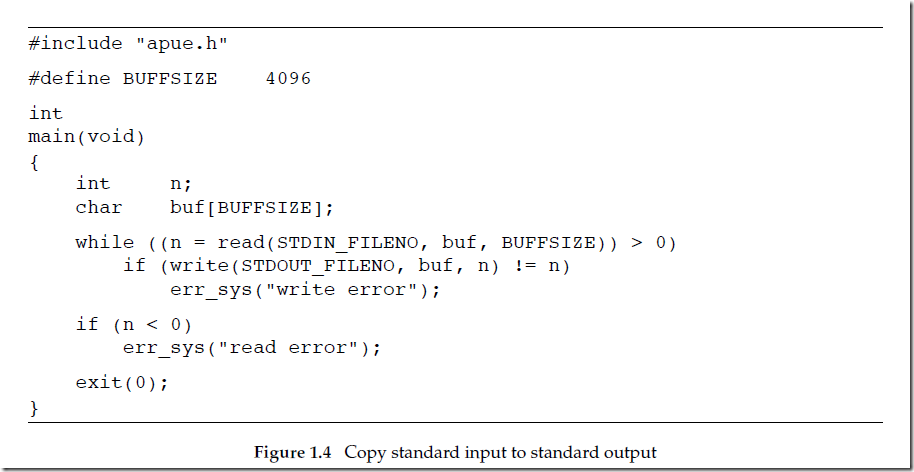

// 1.4CopyStandardInputToStandardOutput.cpp
#include "../apuesunyj.h"
#define BUFFSIZE 4096
int main()
{
int n;
char buf[BUFFSIZE];
// By convention, all shells open three descriptors whenever a new program is run:
// standard input, standard output, and standard error.
// STDIN_FILENO specify the file descriptor for standard input
// Unbuffered I/O is provided by the functions open, read, write, lseek, and close.
// These functions all work with file descriptors.
// The read function returns the number of bytes that are read, and this value is used
// as the number of bytes to write. When the end of the input file is encountered, read
// returns 0 and the program stops. If a read error occurs, read returns -1.
while ((n = read(STDIN_FILENO, buf, BUFFSIZE)) > 0)
{
if (write(STDOUT_FILENO, buf, n) != n)
{
err_sys("write error");
}
}
// usually n is bigger than 0, if input ctrl + d
// then n is equal to 0
if (n < 0)
{
err_sys("read error");
}
return 0;
}
// The standard I/O functions provide a buffered interface to the unbuffered I/O
// functions. Using standard I/O relieves us from having to choose optimal buffer sizes,
// such as the BUFFSIZE constant in Figure 1.4. The standard I/O functions also simplify
// dealing with lines of input (a common occurrence in UNIX applications). The fgets
// function, for example, reads an entire line. The read function, in contrast, reads a
// specified number of bytes. As we shall see in Section 5.4, the standard I/O library
// provides functions that let us control the style of buffering used by the library.
// The most common standard I/O function is printf. In programs that call
// printf, we'll always include <stdio.h> normally by including apue.h as this
// header contains the function prototypes for all the standard I/O functions.
![VOQN(P]OKF7~2X9_YCI1[91 VOQN(P]OKF7~2X9_YCI1[91](//images0.cnblogs.com/blog/405501/201503/071722455557348.png)
1 // apuesunyj.h
2 #ifndef APUE_SUNYJ
3 #define APUE_SUNYJ
4
5 #include <errno.h>
6 #include <stdio.h>
7 #include <string.h>
8 #include <stdarg.h>
9 #include <stdlib.h>
10 #include <stdint.h>
11 #include <unistd.h>
12
13 void err_quit(const char *fmt, ...);
14 void err_sys(const char *fmt, ...);
15
16
17 #endif
1 // error.cpp
2 #include "apuesunyj.h"
3
4 int64_t const MAXLINE = 4096; // max line length
5 /*
6 * * Print a message and return to caller.
7 * * Caller specifies "errnoflag".
8 * */
9 static void err_doit(int errnoflag, int error, const char *fmt, va_list ap)
10 {
11 char buf[MAXLINE];
12
13 vsnprintf(buf, MAXLINE, fmt, ap);
14 if (errnoflag)
15 snprintf(buf + strlen(buf), MAXLINE - strlen(buf), ": %s", strerror(
16 error));
17 strcat(buf, "
");
18 fflush(stdout);/* in case stdout and stderr are the same */
19 fputs(buf, stderr);
20 fflush(NULL);/* flushes all stdio output streams */
21 }
22
23 /*
24 * * Fatal error unrelated to a system call.
25 * * Print a message and terminate.
26 * */
27 void err_quit(const char *fmt, ...)
28 {
29 va_list ap;
30
31 va_start(ap, fmt);
32 err_doit(0, 0, fmt, ap);
33 va_end(ap);
34 exit(1) ; // process terminate, not just like return, totally different
35 }
36
37 /*
38 * * Fatal error related to a system call.
39 * * Print a message and terminate.
40 * */
41 void err_sys(const char *fmt, ...)
42 {
43 va_list ap;
44
45 va_start(ap, fmt);
46 err_doit(1, errno, fmt, ap);
47 va_end(ap);
48 exit(1) ;
49 }






















![VOQN(P]OKF7~2X9_YCI1[91 VOQN(P]OKF7~2X9_YCI1[91](http://images0.cnblogs.com/blog/405501/201503/071722455557348.png)


















